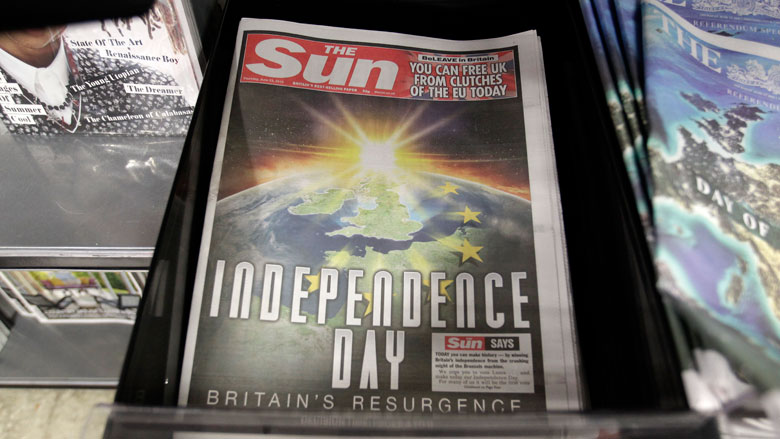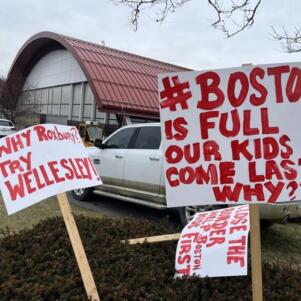Bitter campaign ends as Britons head to polls in momentous EU vote
By CNS News | June 23, 2016, 6:19 EDT
 The front page of the Sun newspaper reporting on the EU referendum on a news stand in Westminster, London, Thursday, June 23, 2016.Voters in the United Kingdom are taking part in a referendum that will decide whether Britain remains part of the European Union or leaves the 28-nation bloc. (AP Photo/Tim Ireland)
The front page of the Sun newspaper reporting on the EU referendum on a news stand in Westminster, London, Thursday, June 23, 2016.Voters in the United Kingdom are taking part in a referendum that will decide whether Britain remains part of the European Union or leaves the 28-nation bloc. (AP Photo/Tim Ireland) London (CNSNews.com) – In June 1975, Margaret Thatcher was the new leader of the opposition Conservative Party, having risen to the position months before. Monty Python and the Holy Grail was playing in movie theaters and on the second day of the month – three days before a referendum that was to keep Britain in the European Economic Community – light snow fell across the nation, appearing as far south as the capital.
On Thursday, at least one bit of that history may repeat itself as British voters go to the polls once again to decide whether they want to remain a part of the European Union, the 28-member economic-political partnership that is the often controversial successor to the EEC. Widespread rain, rather than snowfall, is forecast.
While the first vote was won comfortably by those who wanted to remain, recent polls predict an incredibly close finish in Thursday’s vote, with neither side having a noticeable advantage.
It comes after one of the longest and bitterest political debates in memory.
Opponents of the E.U. have long complained that it saps British sovereignty, ties up the country in a host of European business regulations, and requires billions each year in financial contributions.
Citizens of the E.U. are able to work in any other member country and this has fueled anger over immigration to the United Kingdom, which rose to a net figure of 330,000 in 2015.
Organizations supporting remaining in the union, however, argue that the E.U. has brought peace and stability to a continent once ravaged by war, with the free trade between its members bolstering Britain’s economy.
In 2015, almost half of British exports went to Europe and business leaders like George Soros have warned that that country faces an economic freefall if it leaves the union.
The tone of the campaign has grown increasingly nasty. Last week Labour Party member of parliament Jo Cox, a supporter of the “Remain” camp, was shot and stabbed to death by an allegedly deranged man.
Speaking to the BBC early this week, Prime Minister David Cameron invoked Winston Churchill in May 1940 – after the fall of France to the Nazis – as one of his inspirations for wanting to remain in the E.U.
“He didn’t want to be alone,” Cameron said. “He wanted to be fighting with the French, the Poles and the others. But he didn’t quit. He didn’t quit on Europe, he didn’t quit on European democracy, he didn’t quit on European freedom.
“We want to fight for those things today – and you can’t win, you can’t fight if you’re not in the room,” he added.
‘Vote Leave and take control’
While the main opposition parties have generally been united on the “Remain” side, many prominent members of the ruling Conservative Party have joined the “Leave” camp, among them former education minister Michael Gove and former London Mayor Boris Johnson.
Johnson, long touted as a potential successor to Cameron, said Tuesday night that deals negotiated by Cameron with the rest of the E.U. to curb immigration have failed dramatically.
“There is only one way to achieve that,” he said, “And that is vote ‘Leave’ and take control.”
The vote, a 2013 campaign pledge on Cameron’s part, will include British citizens living in England, Scotland, Wales and Northern Ireland.
Through quirks in election law, citizens of Ireland and of the 54 members of the British Commonwealth living in the U.K. will also be able to vote, as will many British expatriates, the citizens of Gibraltar, and members of the House of Lords, who are usually barred from casting a ballot.
Paula Keaveney, a former parliamentary candidate and a lecturer in politics at Edge Hill University in Lancashire, said this referendum was markedly different than a general election.
In a general election, political parties had “safe seats” or constituencies where they held a majority of the voters and thus didn’t have to target with much time or money, she said.
In contrast, the referendum will be won by a simple majority, which means that every vote has had to be fought for and every city and town contested.
Another complication, Keaveney said, was the increasing use of postal voting, which altered the rhythm of the campaign.
An estimated one in six voters sent their votes in through the mail for the general election of 2015. For the referendum, absentee ballot forms were sent out in late May.
“The campaigns needed to peak their campaigns then, and then peak their campaigns [again] now,” she said.
Mike Smithson, political expert and moderator of the popular Political Betting blog, said he thought Cameron would probably survive in the short term, no matter the referendum result.
One factor, he said, was that Cameron had already promised he would not seek reelection in 2020. Another was that an able pair of hands would be needed if the U.K. was going to negotiate its exit from the E.U.
In the end, the 49-year-old Cameron was also the type of politician who adapted quickly to changing circumstances, he said.
“I think he’s sharp enough to move on very fast,” Smithson added.
Tereza Capelos, a senior lecturer in political psychology at the University of Birmingham, said she has been generally disappointed by both sides’ campaigns.
While she had hoped the referendum could have been a useful learning experience, it had been too negative, producing fear and anxiety – much like recent American presidential campaigns, she said.
Once cynicism has been bred into a younger generation of voters, that quickly turns into disengagement with the political process, Capelos argued.
“In the end, regardless of the outcome of the referendum, we all have to live together,” she said.
— Written by Kevin McCandless










